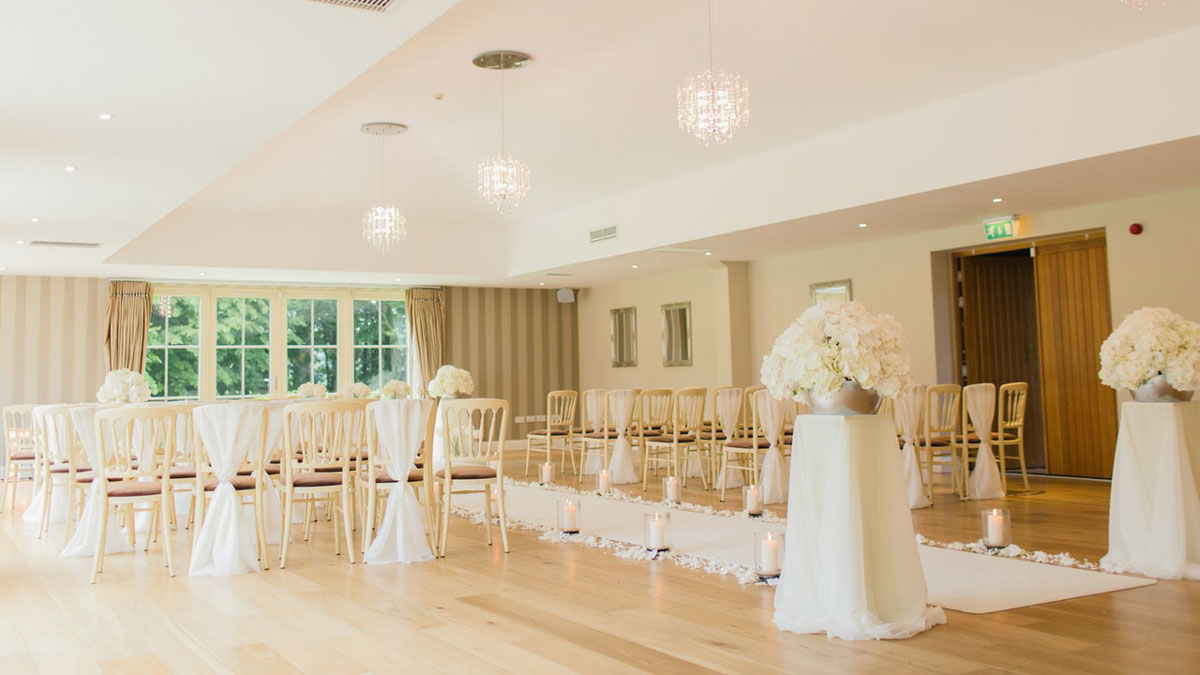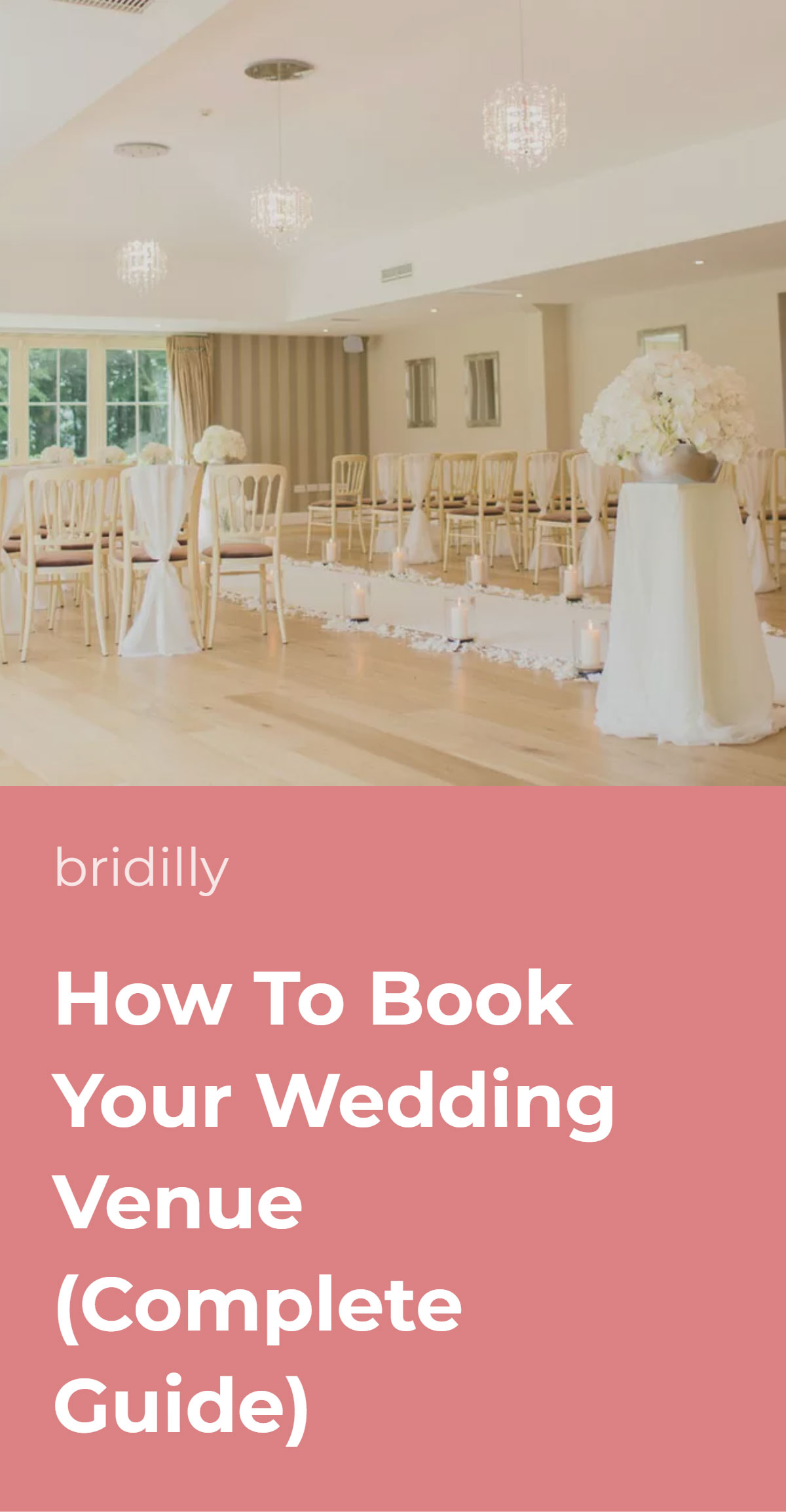Choosing a place to tie the knot is exciting, but not every couple knows how to book a wedding venue to avoid pitfalls.
Wedding venue booking isn’t all fun and games – it also involves a lot of organizational questions and paperwork.
Couples should be aware of wedding venue viewing etiquette, important contract points, which questions to ask, how to negotiate, and the booking timeline.
Venue choice is a huge responsibility, given its high price and importance. However, attending gorgeous spaces where you could potentially get married is also inspiring and uplifting.
Although wedding planning is complex, don’t stress it – you will undoubtedly find the perfect venue if you learn which details to address and define what you want precisely.
Table of Contents [show]
Finalize The Guest List, Event Style, & Budget
As a rule of thumb, it’s best to book the venue sooner rather than later. However, one of the most common mistakes in wedding planning is booking the venue before finalizing the guest list, budget, and event style.
Naturally, there’s no way of knowing the exact guest count until you receive the RSVPs. However, you should at least know the maximum guest number to ensure your chosen venue can accommodate everyone.
Some couples book a larger than necessary venue to allow for sudden changes. However, they often pay extra for space they don’t use.
Suppose you book the venue before finalizing the guest list. In that case, you may have to uninvite someone from the wedding (which can permanently ruin your relationship) or deal with venue cancellation fees.
Budget changes are another common factor affecting venue booking. The budget may change due to unplanned non-wedding-related expenses, switching jobs, parent contributions, or shift in priorities.
Either way, if you don’t have enough money to pay for a venue, you may have to change it. In contrast, if you suddenly find extra money, you may want to book a better place.
Lastly, decide on your wedding style early. The interior is vital for creating the atmosphere, so your venue should align with your vision. Research wedding styles and themes in advance and don’t change your mind after the venue is booked.
When To Book
When to book a wedding venue depends on a scope of factors. The earliest time to book a wedding venue is after you’ve finalized the guest list, budget, and style, but what’s the deadline?
The wedding venue booking deadline primarily depends on the invitation timeline and season. Typically, couples send formal invitations that contain detailed information about the venue about three to four months before the big day.
However, couples getting married in peak wedding season between May and October should book their venue even earlier, nine to 16 months before the event. On the other hand, couples getting marred off the season can wait until four months in advance.
Destination weddings require early venue booking, at least a year in advance, especially for popular wedding spots such as Venice or Hawaii.
The Importance of Viewings
Booking a wedding venue without ever seeing it in person is a big no. Professional photographers know how to make any space look great in pictures, so wedding venue viewings are a must.
Comprise a list of venues in your chosen area and give yourself plenty of time to attend multiple viewings. You should like the venue’s atmosphere, location, size, and everything else about it.
After you visit a venue, you can start picturing the decoration, considering the best picture spots and the table placement.
Wedding venue viewings are also necessary to meet the team who will potentially work on making your big day unforgettable and ask the hard questions related to organization, contract, and fees.
You shouldn’t feel forced to book a venue right after viewing it. There’s nothing wrong with refusing a booking if you find a better option. But if you change your mind after booking, you may have to deal with cancellation fees.
How To Negotiate The Venue Cost
Knowing how to negotiate wedding venue fees is helpful for any couple. Weddings are costly affairs, and most couples have to prioritize specific features over others – but this may not be necessary if you negotiate the price.
Start by doing your research. Request quotes from multiple venues in your area, even if you don’t consider them for your event. Online wedding venue pricing guides can also help. However, note that prices may fluctuate based on various factors.
Gathering enough information about wedding venue cost isn’t all you need for successful negotiations. You should also know how to behave. Ask confidently and don’t attach any emotion to the outcome.
Don’t take refusals personally, and don’t expect to book a venue for a specific sum. Be ready to haggle. After you make an offer, you’ll likely receive a counteroffer above your asking price but below the initial price.
Don’t accept the first counteroffer unless you are genuinely satisfied with the price. Make another offer to get a better deal. Remember to start low – the general recommendation is to ask for a 20% discount with the first offer.
Even if the desired venue refuses to negotiate, you may ask them for upgrades such as free parking or better champagne. However, remember not to be too pushy, or the vendors will not be willing to work with you.
What’s Included in The Price?
Before finalizing your booking, you should find out what’s included in the wedding venue price. Ask the venue manager how much time in the venue you’ll have, whether they offer catering and alcohol or not, and whether a security is included.
Sometimes, seemingly essential things such as cleaning come at an extra fee, although they are mandatory. Ask the managers to break down the total cost into specific fees – this will help you understand the deal’s actual value and help in negotiation.
Some wedding venues provide tables, chairs, linens, and tableware for free; others rent them out for an extra fee; lastly, some spaces don’t provide rentals at all, and couples have to deal with third parties.
Note that venues may have different pricing models. Some may charge you a flat fee for unlimited guest amount and time, while others may charge an hourly fee or per person.
What Questions To Ask
Questions to ask a wedding venue aren’t limited to general information such as availability, pricing, and guest count. Some points aren’t as obvious but equally important.
Ask how much time you will have to set up and break down the decorations and whether you can get help with that. Determine who will be your primary contact on the day of to avoid communication issues.
Find out whether you’ll be alone in the venue or they accommodate other events. Ask whether the venue welcomes children and what safety restrictions they have – for example, some spaces may restrict the use of candles.
Ask the venue manager about coat check service availability, on-site wedding coordinators, and security options. Find out how many people the dancefloor accommodates and whether there is outdoor space you can use.
Define whether you need to hire a bartender and DJ or the venue already has the necessary staff. Note that some venues have noise restrictions and may prohibit you from bringing in a DJ or a band.
You should also ask questions about the parking, accessibility, high chairs or changing tables for children, restrooms, availability of electric outlets, hotels nearby, and public transport.
Other questions to ask a wedding venue manager depend on your personal needs and preferences. Comprise a list of questions before attending your viewings to avoid missing vital points.
Important Contract Points
Apart from organizational points, you should clear tedious yet critical contractual questions before booking a venue. First, find out payment terms and conditions, including extra fees, the deposit, cancellations, and refunds.
Read the contract carefully for insurance information and learn about your liability, obligations, and rights. Don’t be afraid to ask uncomfortable questions or argue contract points that seem off, but don’t be too pushy or impolite.
Typically, the first question of a wedding venue booking contract contains general information such as the couple’s name, current and wedding dates, venue rental fee, what the price includes, and contact information.
The second section usually defines legal terms and lays out core agreement terms, including decoration, coordination, catering, communication, and other organizational details.
The third section should lay out the fees in detail and the payment schedule. The next part defines damage and insurance terms and conditions. The contact section order may vary, but you should ensure no points are missing.
Set The Payment Timeline
The average price of a wedding venue exceeds $10,000 or 30% of the total event cost. Most couples can’t pay this sum out of pocket. Furthermore, it isn’t recommended because couples may experience issues with changes and cancelation.
Setting the venue payment schedule is vital. Typically, wedding venues request a 30%-50% deposit during booking, and the rest can be paid in installments or before a set date.
Usually, the venue fee must be paid in full about two to three months before the big day to ensure the venue has enough time to find another couple in the case of cancelation.
Be aware of smaller deposits. They don’t necessarily indicate a low venue quality, but you would have to pay more right before the wedding when the money gets tight.













No Comments Add one
Leave a Comment